DM2023: equality
Discrimination and prejudice in the workplace needs to be called out and robust polices put in place, conference agreed.
Delegates at DM2023 heard how an Asian journalist at the BBC found herself passed for promotion by less inexperienced white colleagues, until the NUJ intervened on her case.
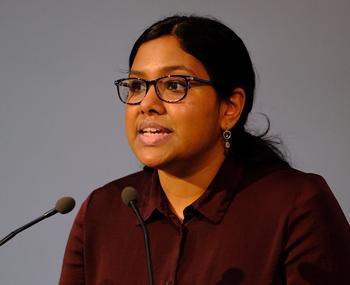
Saadeya Shamsuddin said covert racism was a huge problem. “No-one was calling me the P-word,” she said. “but, I was seeing white colleagues being given opportunities that I wasn’t getting and twice in six months I was passed over for promotion. This experience was not uncommon – the TUC’s landmark survey revealed more than 120,000 workers quit their jobs because of racism – and my brothers and sisters are tired from having to prove racism is rampant.”
Saadeya’s case was taken up by the union, her complaints about the promotions were upheld, she was moved to a managerial position and her editor no longer works at the BBC. She was sharing her experience while proposing a motion, carried by conference, to instruct the union to make as a priority, campaigns to lobby for mandatory reporting of the ethnic minority pay gap and for the industry to put in place robust policies to combat racism.
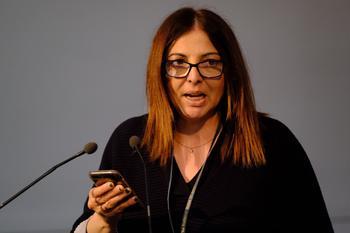
Raj Ford seconding the motion, also works for the BBC. She said: “I work for an employer which thinks it’s ok to use the N-word in full on a TV report which went out on the BBC in the West Country. It was only challenged when black and Asian colleagues objected to bosses. I’m fully aware of the choices that were made by managers which allowed that to happen…it’s not a good look. This lack of understanding, knowledge and sensitivities is everywhere across the workplace.”
She also referred to the TUC survey which gave examples such as the British Indian woman who was told she was overlooked for a job because the company did not want front-facing staff wearing “funny clothes”. She felt too intimidated to make a complaint. Raj said: “It’s important to support workers from minority ethnic backgrounds. Take their experiences seriously and act. Unions have an important role to play in encouraging workers who’ve experienced racism to report the behaviour and to have the courage to stand up against it.”
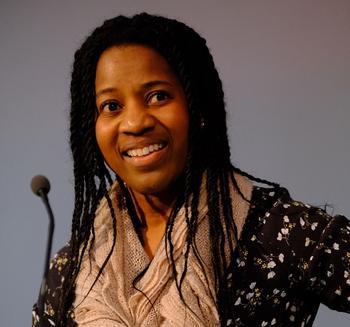
Leoni Robertson, speaking for the NEC, said the government had published ethnicity pay reporting guidance for employers but had not made reporting it mandatory. She had discussed at the BBC: “They say it is too complicated – but it isn’t. When you have a gap of 15 per cent, something must be done. There is a serious problem about progression and retention, we are seeing black and ethnic minority staff leaving because their salaries are not high enough.”
An Equality Council motion noted Baroness Casey’s review which exposed misogyny, racism and homophobia and a toxic culture in the Metropolitan Police Service (MPS). Women journalists shared concerns about their safety in approaching a police officer if they needed help. Conference agreed that the union would use its discussions with the MPS to “highlight concerns around the safety of women, minoritised ethnic groups and other discriminated groups” .
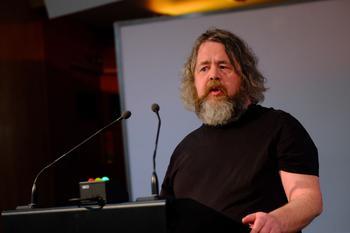
A Disabled Members’ Council (DMC) motion put in train a campaign to highlight the issue of accessibility of visual digital journalism and to provide guidance on improving it. Johny Cassidy, BBC London branch, explained that while infographics and interactive charts were useful to illustrate stories, the downside is not everyone, including the 2m people in the UK with some sort of sight loss, can read them. Read his article in NUJ Branch which give tips on using alternative texts.
The union agreed to continue to support the work of the TUC Long Covid Support Employment Group and share resources to increase reps’, members’ and employers’ understanding of the condition. The TUC’s report Workers’ Experiences of Long Covid highlighted how people are being failed by their employers and by government from a lack of health and safety measures, including effective ventilation, to poor treatment in response to Long Covid. People with the condition were experiencing discrimination. The Office for National Statistics’ figures for January–March 2023 showed 1.9m to 2m people with Long Covid.
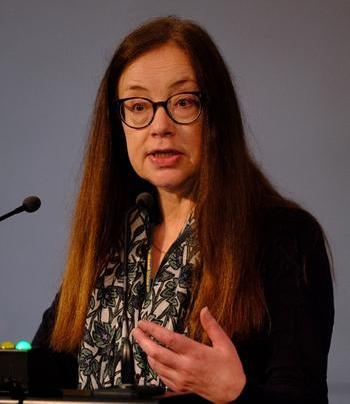
Ann Galpin, DMC, said the TUC study found that 49 per cent of people who suffer from Long Covid caught it at work. She said: “Ministers are handwringing about the rise in economic inactivity and gaps in the workforce, and yet here we have one in seven skilled, experienced workers, including many key workers such as teachers and nurses as well as media workers, losing their jobs to Long Covid. These ministers should make the link with Long Covid and make the appropriate adjustments so they can return and stay in work.”
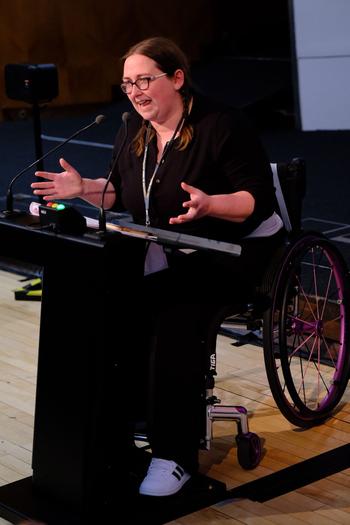
Gemma Stevenson proposed another DMC motion which noted that disabled sports journalists had benefited from digital accreditation to sport events during the pandemic. Gemma, who uses a wheelchair, had been able to cover major international tournaments without having to travel. She said: “I was able to provide the same coverage as if I had been there.” However, many sporting governing bodies had reverted to in-person reporting. DM agreed the union would lobby for more hybrid styles of media accreditation and encourage the union’s Parliamentary Group to raise the issue of improving access to disabled reporters and spectators to sporting events.
An Equality Council motion raised the issue of domestic abuse, noting that it disproportionately affects women. It said: “Domestic abuse affects performance at work and attendance, putting people at risk of losing their jobs or clients. Employers need to be more proactive in spotting signs of abuse and having appropriate support measures in place.”
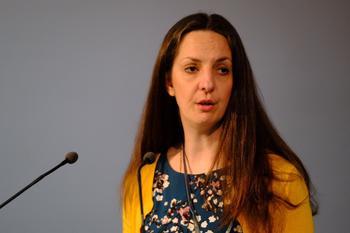
Natasha Hirst, NUJ incoming president, spoke to delegates as a survivor of domestic abuse. “Nine years ago," she said, “I was living in a women’s refuge and was unable to work for almost three years. It was the NUJ which helped me to rebuild my life and get my career back on track.” The union will now work to encourage employers to adopt domestic abuse policies and provide chapel reps and branches with the tools to put these in place, including advice on the steps to take should a member disclose abuse. Members will be encouraged to “look out for each other and endeavour to make our events, branches and chapels safe and inclusive spaces”. Anna Hervé, NEC books’ member, described arriving at the London Books Fair with a black eye and cracked ribs to be met with a “well-meaning” silence. “Working practices such as working from home is making it worse. The NUJ should be pushing employers, branches and chapels and asking ‘What are doing about domestic abuse?’” she said.
Seamus Dooley, assistant general secretary told conference the union would set up a network to promote Irish language journalism and support journalists working in minority languages, who often struggled to get work. He was responding to a motion proposed by Dublin branch. Éanna Ó Caollaí told delegates that the imposition of the English language on Ireland under colonialisation had marginalised the Irish language. “Language is not just a tool for communication,” he said, “it is a repository of a community’s world view, its collective heritage and it’s a human right.”
The union’s 60+ Council’s motion instructed the union to continue to campaign against ageist discrimination in the workplace and provide career support for older workers. Data published by The Resolution Foundation in November 2022 showed that despite the lowest unemployment rates since the 1970s the number of inactive working age adults had increased by 312,000 since the start of the pandemic and that 91 per cent of that increase comprised workers aged 50-64 years old. It said age discrimination and age-based prejudice had an impact on one in three older people. Jenny Vaughan said a “toxic cocktail of sexism and ageism” was pushing women out of work.
